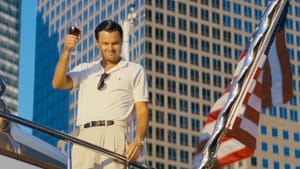Stay in the Loop
BSR publishes on a weekly schedule, with an email newsletter every Wednesday and Thursday morning. There’s no paywall, and subscribing is always free.
Why do we love wolves?
Martin Scorsese's 'Wolf of Wall Street'

The story Martin Scorsese tells in The Wolf of Wall Street is classic Americana: a social climber, Jordan Belfort, strikes it rich by taking H. L. Mencken’s advice — “Nobody ever went broke underestimating the intelligence of the American people.” Belfort starts out by selling penny stocks to people who don’t know any better, then gets ever richer by selling them to people who should.
Wolf is all about excess. There is more cocaine snorted, quaaludes popped, prostitutes banged, champagne spilled, money squandered, f-bombs dropped, and scenes of indescribable decadence than in any major motion picture given an R rating and probably more than most X-rated movies. And it’s almost three hours long.
Shortly after it was released, the daughter of one of the con men depicted in the movie wrote an open letter to Scorsese and Leonardo DiCaprio, telling them what scum they are for making a movie that praises the lifestyle of people who have destroyed lives with no more thought than killing a bug. She tells them that she is officially turning over to them the shame she has felt for years at being this guy’s daughter.
Actually Scorsese and his writer, Terence Winter, just depict — and not necessarily praise — the lives of a bunch of cocaine-snorting, money-grubbing, midget-throwing, prostitute-addicted lowlifes; but showing nobodies getting extremely rich while defrauding people and living the life of the rich and fatuous is as close to praise as you can get in this country.
Who's the hero?
The problem of portraying evil without making it look appealing dates back to the the birth of modern literature. No less a writer than John Milton struggled with the problem in his magnum opus, Paradise Lost. All the critics agree that the most interesting character in Milton’s tale of good versus evil is, well, evil, as personified by the mother of all evildoers, the devil himself, Lucifer. Everybody prefers Mr. Hyde to Dr. Jekyll.
The history of the movies is studded with blockbuster hits about bad guys whose lives are full of violence, greed, addiction, and that fourth horseman of modern depravity, casual sex. The problem is that from Valentino’s Sheik — he kidnaps the woman he wants — to Jordan Belfort, movies make heroes of those they portray.
And no matter how hard a filmmaker tries to show us how bad a guy is, audiences love them.
Take The Godfather. Francis Ford Coppola shows the transformation of Michael Corleone from a WWII hero who wants nothing to do with the family business to the most ruthless mafia don in America. I saw the movie shortly after it came out at the long-gone Fox movie palace on 16th and Market in Philadelphia. The culminating scene in the movie is a now-classic montage: Michael acts as the godfather to his nephew (whose father he soon will have garroted), renouncing the devil. This scene is cut together with scenes where Michael’s henchmen murder his rivals. As each mafia don was brutally wiped out, a cheer went up in the theater. The audience was applauding Michael’s bloody triumph.
Why, I wondered, was everyone applauding this murdering conniver?
The answer is simple — people love to watch bad guys be bad and succeed. Maybe it’s because it provides an easy answer to why so many of us perceive our own lives as failed. If I had been willing to [fill-in-the-blank (murder, cheat, betray, steal)], I would be rich and successful too. Of course, in the old Hollywood, all these bad guys ended up like their template, Lucifer, in hell. But finally Hollywood came to the conclusion that the American people can take the truth: greed is good.
What sets Wolf apart from the other classics that celebrate the bullies is the fact that Wolf is not a very good movie. For three hours, we watch a super-salesman hump, snort, cheat, hustle, and deceive his way to the top of the FBI Wall Street hit list. (By the way, the FBI’s history of prosecuting Wall Street elites proves that its Wall Street hit list is a very short list, and you have to be really, really bad to get on it). In the end, the Wolf loses all the money he stole from others and ends up selling himself as a self-help guru. As the daughter who turned over her shame says, these guys always land on their feet.
Where do you draw the line?
So is a filmmaker or writer or artist promoting the evil he or she portrays?
Not necessarily, but how much sex do you need to show before you fall into the porno well? Is it just the fact that you’re not showing the actor’s penis that makes such depictions art and not porn? There is such a thing as violence porn. How about financial porn? In Wolf, greed is not only good, it’s the reason for living.
So what is Scorsese trying to tell us? Our country has gone berserk by letting guys like this get away with financial butchery? Is this an “only in America” tale? Maybe. If so, Wolf fails because the idea that this movie is an indictment of the system is nowhere to be found in the movie itself. In the end, we have one more movie that is about all that the people who made it claim to hate.
At least at the end of The Godfather Michael is forced to lie to the one person in the world he loves, his wife. And by doing that, he destroys the one thing he claims to care about, his family. Jordan Belfort cares about no one and nothing. Even when he loses his family, his friends, and his money, he couldn’t care less.
Frankly, neither could I.
For Paula Berman's take on the appeal of TV's antiheroes, click here.
What, When, Where
The Wolf of Wall Street. Directed by Martin Scorsese. Philadelphia area showtimes here.
Sign up for our newsletter
All of the week's new articles, all in one place. Sign up for the free weekly BSR newsletters, and don't miss a conversation.

 Armen Pandola
Armen Pandola